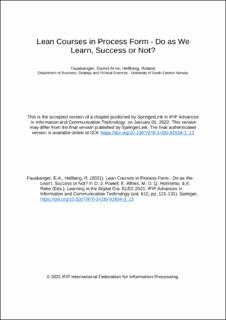| dc.contributor.author | Fauskanger, Eivind Arne | |
| dc.contributor.author | Hellberg, Roland | |
| dc.date.accessioned | 2023-05-09T12:09:50Z | |
| dc.date.available | 2023-05-09T12:09:50Z | |
| dc.date.created | 2022-01-19T10:13:28Z | |
| dc.date.issued | 2021 | |
| dc.identifier.citation | Fauskanger, E.A., Hellberg, R. (2021). Lean Courses in Process Form - Do as We Learn, Success or Not? In D. J. Powell, E. Alfnes, M. D. Q. Holmemo, & E. Reke (Eds.), Learning in the Digital Era. ELEC 2021. IFIP Advances in Information and Communication Technology (vol. 610, pp. 121-131). Springer. | en_US |
| dc.identifier.isbn | 978-3-030-92933-6 | |
| dc.identifier.uri | https://hdl.handle.net/11250/3067298 | |
| dc.description.abstract | Experience of successful improvements in organizations based on lean methods shows that participation and involvement are the keys. Based on this, a university-level continuing course has been created that focuses on quality improvements. Students gain knowledge of various lean and quality tools, as well as of implementation processes. The students learn essential tools and implementation processes gradually, while at the same time using this knowledge. The course is structured in modules with intermediate work steps, where the intention for students is to use their knowledge in quality improvement projects at their workplace. The underlying idea is that the course modules correspond to the Plan, Do, Check, Act (PDCA) methodology. The exam consists of submitting a folder with reports from the intermediate work steps and a final report. This course has been offered and completed twice, with the third in progress as of this date. We describe the background for our choice in quality and process tools as well as the examination form. In addition, results from a survey among the participating students on their opinions of the course content, structure, and examination form, are presented. We conclude that students who take this further education in parallel with their regular work are of great benefit to their employers, as the course is module-based, and the participants work on a project at their workplace. In addition, the students appreciate interweaving theory and knowledge training. The course grades are determined on a final report based on sub-assignments where the students do an academic reflection on their improvement project. | en_US |
| dc.language.iso | eng | en_US |
| dc.relation.ispartof | Learning in the Digital Era: 7th European Lean Educator Conference, ELEC 2021, Trondheim, Norway, October 25–27, 2021, Proceedings | |
| dc.title | Lean Courses in Process Form - Do as We Learn, Success or Not? | en_US |
| dc.type | Chapter | en_US |
| dc.description.version | acceptedVersion | en_US |
| dc.rights.holder | © 2021 IFIP International Federation for Information Processing. | en_US |
| dc.source.pagenumber | 121-131 | en_US |
| dc.source.volume | 610 | en_US |
| dc.identifier.doi | https://doi.org/10.1007/978-3-030-92934-3 | |
| dc.identifier.cristin | 1984374 | |
| cristin.ispublished | true | |
| cristin.fulltext | postprint | |
| cristin.qualitycode | 1 | |
